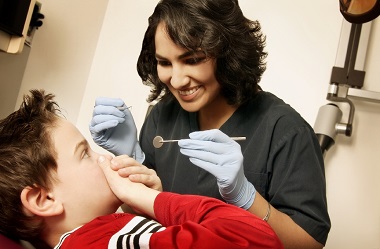Study: Expanding Scopes of Practice for Dental Hygienists Improves Oral Health
 |
|
A CWHS study finds that scope of practice closely aligned with dental hygiene professional competence produces a significant association with positive oral health outcomes.
|
ALBANY, N.Y. (December 6, 2016) -- Research conducted by the University at Albany's Center for Health Workforce Studies (CHWS) finds that in states where dental hygienists are allowed by law to practice at higher levels of professional competence and skill, the population's oral health notably improves.
The paper, published in Health Affairs’ December 2016 thematic issue on oral health, examines impacts of dental hygiene "scope of practice" on oral health outcomes. Scope of practice for health professionals is defined by individual states’ laws and regulations, which describe permissible settings, allowable services, and requisite supervision by other health professionals.
CHWS researchers examined 2014 scope of practice parameters for dental hygienists across the nation and found that in states where dental hygiene scope of practice rules were closely aligned with dental hygiene professional competence, there was a statistically significant association with positive oral health outcomes in the population.
The paper, “Expanded Scopes of Practice For Dental Hygienists Associated With Improved Oral Health Outcomes For Adults,” be highlighted at a briefing event in Washington D.C. convened by Health Affairs on December 7, 2016. Deputy Director Margaret Langelier of the Oral Health Workforce Research Center (OHWRC) at CHWS, who led the research team for the study, will present findings at the briefing.
“Demonstrating that broader scopes of practice for dental hygienists are correlated with better oral health outcomes is very useful, especially in public health settings,” said Langelier. “The impact of scope of practice is an important consideration for policymakers when identifying strategies to increase the availability of preventive oral health services, particularly for underserved populations.”
The study was funded under a Cooperative Agreement with the Health Resources and
Services Administration (HRSA) of the US Department of Health and Human Services (HHS) under grant number U81HP27843, to establish an Oral Health Workforce Research Center. For more information, visit the Oral Health Workforce Research Center.
View the recent Health Affairs article here.
About the Center for Health Workforce Studies
Established in 1996, CHWS is an academic research organization, based at the School of Public Health, University at Albany, State University of New York (SUNY). The mission of CHWS is to provide timely, accurate data and conduct policy relevant research about the health workforce. The research conducted by CHWS supports and promotes health workforce planning and policymaking at local, regional, state, and national levels. Today, CHWS is a national leader in the field of health workforce studies, and the only HRSA-sponsored center with a unique focus on the oral health workforce.
![]() For more news, subscribe to UAlbany's RSS headline feeds
For more news, subscribe to UAlbany's RSS headline feeds
A comprehensive public research university, the University at Albany-SUNY offers more than 120 undergraduate majors and minors and 125 master's, doctoral and graduate certificate programs. UAlbany is a leader among all New York State colleges and universities in such diverse fields as atmospheric and environmental sciences, business, education, public health,health sciences, criminal justice, emergency preparedness, engineering and applied sciences, informatics, public administration, social welfare and sociology, taught by an extensive roster of faculty experts. It also offers expanded academic and research opportunities for students through an affiliation with Albany Law School. With a curriculum enhanced by 600 study-abroad opportunities, UAlbany launches great careers.


